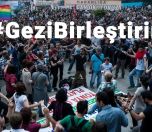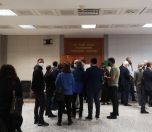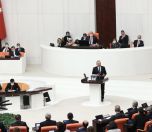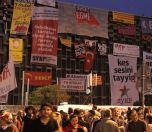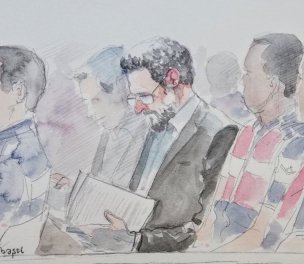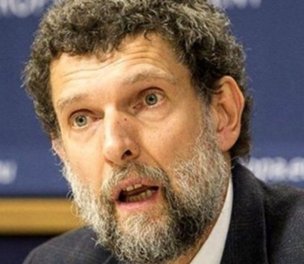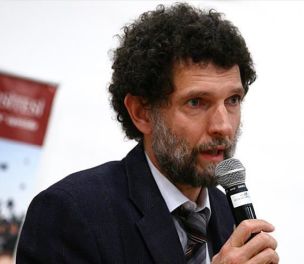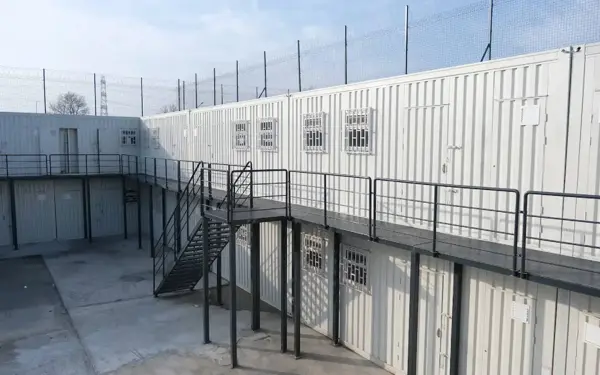Click to read the article in Turkish / Kurdish
The Gezi case, where 52 defendants, including businessperson Osman Kavala, who has been imprisoned for 1,488 days, continued today (November 26).
The court ruled for the continuation of Kavala's arrest with one judge expressing a dissenting opinion.
Ahead of the hearing, the Taksim Solidarity made a statement for the press in front of the İstanbul Courthouse in Çağlayan.
MPs from the Republican People's Party (CHP), the Peoples' Democratic Party (HDP) and the Workers' Party of Turkey (TİP) were also in front of the courthouse.
Reading out the statement, Esin Köymen of the Arcihtects Chamber said the Gezi Resistance was subject to trial for the third time "on unfounded allegations," even though it was confirmed by judicial decision twice that it "took place on a constitutional basis."
"Your efforts to defame the Gezi Resistance once again through judicial means are futile! We will not allow you to distort the facts! We won't allow you to denigrate the resistance of millions of people in parks, streets and squares for their democratic rights and demands, for freedom, democracy and a human life with your pre-ordered scenarios."
MP: I expect a release
CHP deputy Sezgin Tanrıkulu said Kavala is still in prison "because Mr. President, who is the chief prosecutor of Turkey, wants him to remain under arrest."
However, recalling an appeal by the ambassadors of 10 countries for Kavala's release last month, Tanrıkulu said, "I expect him to be released today because Mr. President said 'the judiciary will do what is necessary.'"
Kavala didn't attend the hearing
After the statements, the hearing started at around 10.30 a.m. Osman Kavala did not attend the hearing.
Pointing out the president's statements targeting him, Kavala said, "I believe it's pointless for me to attend the hearings and make a defense."
After the joint statement by he 10 ambassadors, the president had called Kavala "a leftover of Soros."
"Why do these 10 ambassadors make this statement? Those who defend this leftover of [George] Soros are striving to get him released," he had said.
Summary of Osman Kavala's arrest17 October 2017: Osman Kavala was detained. 1 November 2017: Kavala was ordered arrest on the charges of 'attempting to overthrow the government or to prevent it from exercising its functions' (Article 312 of the TCC) and 'attempting to overthrow the constitutional order through force and violence' (Article 309 of the TCC). 24 December 2018: The investigation files under Article 309 and 312 of the TCC were separated. 19 February 2019: The first indictment against Kavala was issued under Article 312 of the TCC 16 months after he was arrested. 11 October 2019: A release order was issued in favor of Kavala on the charge under Article 309 of the TCC. 10 December 2019: The ECtHR ruled that Kavala's detention constituted a violation of human rights and that he should be released immediately. 18 February 2020: A decision of acquittal was issued in the trial heard under Article 312 of the TCC. 19 February 2020: After the decision of acquittal, Kavala was not released but was arrested again on the charge under Article 309 of the TCC. 9 March 2020: Kavala was ordered arrest under Article 328 of the TCC. 20 March 2020: The second release order was issued in favor of Kavala under Article 309 of the TCC. However, his detention on the charge of espionage under Article 328 of the TCC continued. 3 September 2020: The Committee of Ministers of the Council of Europe, which oversees the execution of the judgments of the ECtHR, ruled that the judgment of the ECtHR should be executed and that Kavala should be released immediately. 29 September 2020: The Constitutional Court of the Republic of Turkey decided to examine the application of Kavala regarding his unlawful detention. However, it postponed the examination as the second indictment including the charges under Articles 309 and 328 (espionage) of the TCC was submitted to the court on the same day. 29 September 2020: In the second meeting in which this matter was discussed, the Committee of Ministers of the Council of Europe ruled that an interim decision should be drafted to be issued in the event that the judgment of the ECtHR is not executed. 3 December 2020: The Committee of Ministers of the Council of Europe issued an interim decision that Kavala should be released immediately and that the Constitutional Court should examine the file in accordance with the judgment of the ECtHR without further delay. 15 December 2020: The Constitutional Court decided to examine the application regarding the unlawful detention and ruled that the file should be referred to the General Assembly of the Constitutional Court. 18 December 2020: The 36th Assize Court ruled that the detention shall continue. The second hearing was scheduled on 5 February. 29 December 2020: The Constitutional Court ruled with 8 to 7 votes that the decision of Kavala did not constitute any violation of right. The reasoned judgment included the strongly dissenting opinions of the judges who voted that the detention constituted a violation of rights. 22 January 2021: The Appellate Court overturned the decision of acquittal in the Gezi trial. It ruled that the file concerning this trial shall be examined together with the files under Articles 309 and 328 of the TCC. 28 January 2021: After the decision of acquittal was overturned, the 30th Assize Court issued a preliminary proceedings report and scheduled the trial concerning the consolidated files on 21 May 2021. 5 February 2021: In the trial heard in the 36th Assize Court, the Court ruled that Kavala's trial shall be consolidated with the Gezi Trial, which will be heard again in the 30th Assize Court under Article 312 of the TCC, and that the detention of Kavala on the charges of espionage under Article 328 of the TCC shall continue. 30 April 2021: As a result of its examination of the detention, the 30th Assize Court ruled that the detention of Kavala shall continue. 12 May 2021: In its weekly meeting of 12 May 2021, the Committee of Ministers of the Council of Europe reviewed Kavala's file and expressed their great concern that Turkish authorities and courts did not take the necessary steps to end Kavala's the continued detention against the judgment of the ECtHR. The Committee urged the member states to bring up the continued detention and immediate release of Kavala during their meetings with Turkish authorities. It pointed out that the detention of Kavala would be reviewed again by the 30th Assize Court on 21 May 2021, and urged the authorities to take all the necessary steps to ensure the release of Kavala. CLICK - Committee of Ministers of Council of Europe: Release Demirtaş and Kavala |
About Gezi Trial* Businessperson Osman Kavala, who was on his way back from Antep, was taken into custody at İstanbul Atatürk Airport on October 18, 2017. * On November 1, 2017, it was announced that Kavala was arrested on charges of "attempting to change the Constitutional order and to overthrow the government." In the official document referring him to court with a request of arrest, it was alleged that Kavala was the head and financier of Gezi incidents. * While Kavala and his attorneys were prevented from seeing the file of the investigation with restrictions, the content of the file was served to the media. * On November 16, 2018, a wave of detentions targeted several people, including some executives of Anadolu Kültür Inc. cofounded by Osman Kavala. * The previously acquitted members of the Taksim Solidarity platform were also summoned to depose and it was reported in the news that there was indeed a more extensive list of investigation. * Imprisoned for 19 months without standing before the judge and without a bill of indictment prepared by the prosecutor's office, even Kavala and his attorneys also had to follow the course of the investigation from the press. * Almost 1.5 months passed without any judicial processes. * The bill of indictment prepared by the prosecutor's office was announced on February 19, 2019, and accepted by the court on March 4. * Issued against Gezi incidents from six years ago in 16 months, the indictment demanded life sentence for 16 people. * The indictment and its annexes were mostly based on wiretapping evidence. It was announced that, mostly consisting of wiretapping evidence, the 657-page indictment also had over 8,000-page additional documents. * The first hearing of the case was held on June 24, 2019. The defendants presented their statements of defense. Yiğit Aksakoğlu, one of the two arrested defendants of the time, was released. * Announcing its ruling on the individual application of Osman Kavala on May 22, 2019, the Constitutional Court concluded that there was "no violation" despite the dissenting opinion of its own rapporteur. * Requests of release for Osman Kavala were rejected in all three hearings on June 24, July 18 and October 9. * Since the Gezi Trial started, the defendants and audience were faced with three different court boards. The presiding judge who requested the release of Osman Kavala was immediately dismissed from his duty. * The European Court of Human Rights (ECtHR) announced its ruling on the individual application of Osman Kavala on December 10, 2019. *Accordingly, the ECtHR has unanimously ruled that there had been a violation of Article 5/1 (right to liberty and security) of the European Convention on Human Rights, and a violation of Article 5/4 (right to a speedy decision on the lawfulness of detention) of the Convention. The Court has said, "By six votes to one, that there had been a violation of Article 18 (limitation on use of restrictions on rights) taken together with Article 5 § 1, and that the respondent State was to take every measure to put an end to the applicant's detention and to secure his immediate release." CLICK - ECtHR: His Pre-Trial Detention Not Based on Reasonable Suspicion Following the ECtHR verdict on Osman Kavala, in the fourth and fifth hearings of the Gezi trial on December 24 and January 28, the court ruled for the continuation of his arrest. Prosecutor's opinion added to the file * The opinion as to the accusations of prosecutor Edip Şahiner was added to the file on February 6, 2020. * The prosecutor of the Gezi Trial has requested an aggravated life sentence for three defendants, Osman Kavala, Mücella Yapıcı and Yiğit Aksakoğlu. * The prosecutor has requested 15 to 20 years of prison term for six defendants, who have been charged with "attempting to overthrow the government of the Republic of Turkey or prevent it from performing its duties by using force": Çiğdem Mater Utku, Ali Hakan Altınay, Mine Özerden, Şerafettin Can Atalay, Tayfun Kahraman and Yiğit Ali Ekmekçi. * He requested the separation of the files of the defendants who are abroad: Ayşe Pınar Alabora, Can Dündar, Gökçe Yılmaz, Handan Meltem Arıkan, Hanzade Hikmet Germiyanoğlu, Memet Ali Alabora and İnanç Ekmekçi. The prosecutor alleged that these seven defendants committed the same acts with Kavala, Aksakoğlu and Yapıcı. Verdict of acquittal * The sixth and final hearing of the lawsuit filed into Gezi resistance was held at the İstanbul 30th Heavy Penal Court in Silivri on February 18, 2020. Announcing its ruling after the statements of defendants and their attorneys, the court board has ruled that Osman Kavala, Mücella Yapıcı, Can Atalay, Tayfun Kahraman, Ali Hakan Altınay, Yiğit Aksakoğlu, Yiğit Ali Ekmekçi, Çiğdem Mater Utku and Mine Özerden shall be acquitted as "there was no concrete and material evidence as to the committal of the offenses charged." The court has also ruled that businessperson and rights defender Osman Kavala, the only arrested defendant of the case, shall be released. The files of the defendants who are currently abroad, namely Can Dündar, Mehmet Ali Alabora, Ayşe Pınar Alabora, Gökçe Tüylüoğlu, Handan Meltem Arıkan, Hanzade Hikmet Germiyanoğlu and İnanç Ekmekçi, have been separated from the others and the arrest warrants previously issued against these defendants have been lifted. New warrants have been issued against them so that their depositions can be taken. |
(HA/VK)






sa.jpg)
